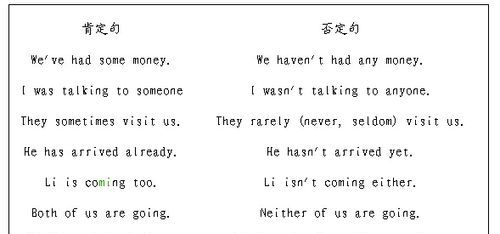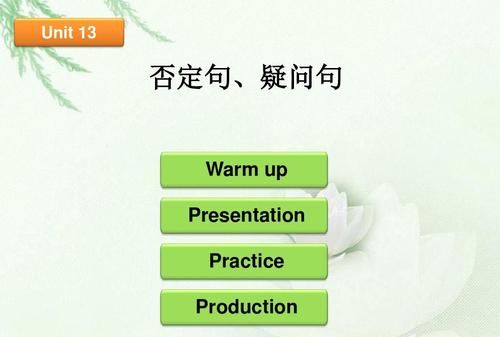本文目录
英语.什么是英语完全否定句的结构
完全否定句就是对句子进行完全的否定。
完全否定句:当句子中含有否定词no, none, nobody, nothing, nowhere, neither, never等表达绝对否定含义的时候,成为i完全否定句。
例如:Nobody knows. 谁也不知道。(没有一个人知道。)

英语否定句的定义及分类
表示否定的句子,必须有否定词。
答话人会讲英语,就应说Yes,I can.如果答话人不会讲英语,就应说No,I can''t.若把答语译成汉语,则Yes,I can.应译为“不,我会”,No,I can''t.应译为“是的,我不会。”如此等等,可见两种语言之间的不同。人们在日常生活中,不论叙述一件事情,提出一项要求,还是回答一个问题等等,不是用肯定语气,就是用否定语气来表达意思。英语中否定句通常借助否定词no,not,never,nothing,nobody,none,etc,半否定词hardlyscarcely,few,little,etc.以及否定词缀构成。但语言是复杂的,形式和意义之间有时会出现不协调的现象:肯定形式可能表达否定意义,而否定形式又可能表达肯定意义。这就使枯燥的语言变得丰富多采、绚丽多姿了。 1.2 否定句的分类英语中的否定方式多式多样,种类繁多,在表达否定概念方面所采用的词汇和表达方式要比汉语丰富得多。就英语否定句的表达形式而言,有用单词或短语表示否定的,也有用特定结构表示否定的;按否定范围分,有全部否定,也有部分否定;就否定形式而言、有单一否定,也有双重否定;就否定的意思而言,有肯定形式表示否定意义的,也有否定形式表示肯定意义的;按表示否定的词的词类划分,分别有名词、动词、形容词、代词、副词、介词、连词等等。为了学习方便,我们根据否定的形式和意义,将英语否定句分为十二类,它们分别是: 1)一般否定句(General Negative Sentences) 2)特指否定句(Special Negative Sentences) 3)部分否定句(Partial Negative Sentences) 4)全部否定句(Absolute Negative Sentences) 5)延续否定句(Continuative Negative Sentences) 6)半(准)否定句(Semi-Negative Sentences) 7)双重否定句(Double NegativeSentences) 8)排除否定句(Excluded Negative Sentences) 9)强调否定句(Emphatic Negative entences) 10)多余否定句(Pleonastic Negative Sentences) 11)含蓄否定句( Implied Negative Sentences) 12)形式否定句(Formal Negative Sentences)第二章 一股否定句(General Negative Sentences) 2.1 概述在英语中,用否定副词not否定谓语动词,并通过否定谓语使全句受到否定,这类否定句统称为“一般否定句”(General Negative Sentences),也叫“整句否定句(Sentence Negative Sentences)。这种含有一般否定的句子就是我们常说的狭义的否定句。在各种否定句式里,一般否定句用得最广。在汉语中用“不”、“不是”、“不可”、“无”等词表示否定意义。 2.2 一般否定句的构成形式 i.土语十连系动词十not十表语 He is not a doctor.他不是个医生。 The China of today is not what it was fifty years ago.今天的中国已经不是五十年前的中国了。 Isn''t it right?这不对吗?望采纳哦,谢谢。

什么是英语否定句
英语语法中否定句分为九种:
(1)一般否定句
I don't know this.否定句式
No news is good news.否定词no
There is no person smoking here.
(2)特指否定
He went to his office,not to see him.
I am sorry for not coming on time.
I don't think/believe/suppose/feel/imagine you are right.
(3)部分否定
All the answers are not right
All is not gold that glitters.
I don't know all of them.
I can't see everybody/everything.
Both of them are not right.
(4)全体否定
None of my friends smoke.
I can see nothing/nobody.
Neither of them is right.
Nothing can be so simple as this.
(5) 延续否定
You didn't see him,neither/nor did I.
You don't know,I don't know either.
He doesn't know English,let alone/to say nothing of/not to speak of (更不用说) French.
(6) 半否定句
We seldom/hardly/scarcely/barely hear such fine singing.
I know little English.I saw few people.
(7) 双重否定
You can't make something out of nothing.
What's done cannot be undone.
There is no sweet without sweat.
No gain without pains.
I can't help /keep/ laughing whenever I hear it.
No man is so old but (that) he can learn.
(8)排除否定
Everyone is ready except you.
He did nothing but play.
But for your help,I couldn't do it.
(9)加强否定
I won't do it at all.
I can't see it any more.
He is no longer a boy.

怎样辨别英语疑问句 肯定句 否定句类型
疑问句分为一般疑问句和特殊疑问句
一般疑问句:Is/Was/Were
it...
Do/Does/Did..
特殊疑问句:有疑问词what
where
when
who
whom
how等等开头的问句。
肯定句就是没有否定词的陈述句。
否定句就是含有否定词的陈述句
常见的否定词:
1.
用no表示。其意为“没有”:
We
have
no
children
of
our
own.
我们没有自己的孩子。
I’ve
got
no
news
from
him.
我没听到他的消息。
【注】no后接名词时也可换成not
any:
I
have
no
[not
any]
friends
here.
我在这儿没有朋友。
2.
用never表示。其意为“从不”:
I
have
never
been
there.
我从未去过那儿。
That
will
never
do.
那决不行。
3.
用little,
few表示。little用于指不可数名词,few用于指可数名词,均表示“很少”:
There
is
little
time
left.
没什么时间了。
Few
people
like
snakes.
很少有人喜欢蛇。
【注】若在其前用不定冠词,则表示肯定意义:
There
is
a
little
time
left.
还有点点时间。
A
few
people
like
snakes.
有少数人喜欢蛇。
4.
用nobody,
no
one,
nothing表示。nobody和no
one用于指人,其意为“没有人”;nothing用于指物,其意为“没有任何东西”:
No
one
[Nobody]
wants
to
go
there.
没有人想去那儿。
She
said
nothing.
她什么也没说。
5.
用none表示。意为“没有人或物”:
None
of
the
pupils
knew
the
answer.
学生中谁都不知道答案。
None
of
this
milk
can
be
used.
这牛奶一点都不能用了。
6.
用neither表示。意为“两者都不”:
I
like
neither
of
the
books.
这两本书我都不喜欢。
Neither
of
us
enjoy
getting
up
early.
我们俩谁也不喜欢早起。
7.
用seldom表示。意为“很少”:
The
children
are
seldom
ill.
这些孩子很少生病。
It
seldom
snows
here.
这儿很少下雪。
8.
用hardly表示。意为“几乎不”:
He
hardly
ever
eats
meat.
他几乎从不吃肉。
Jim
is
hardly
ever
late.
吉姆几乎从不迟到。
9.
用too…to表示。该结构虽不含否定词,但含有否定含义,意为“太…以致不能…”:
It
is
too
late
to
do
anything
now.
现在要做什么已为时太晚。
I’m
too
tired
to
go
any
farther.
我太累了,走不动了。

以上就是关于英语否定句的本质,英语.什么是英语完全否定句的结构的全部内容,以及英语否定句的本质 的相关内容,希望能够帮到您。
